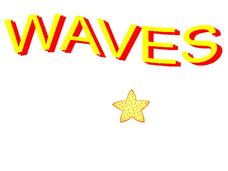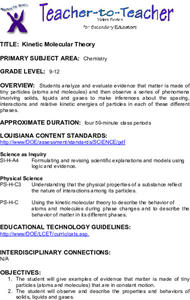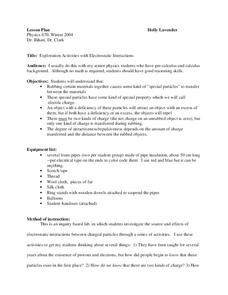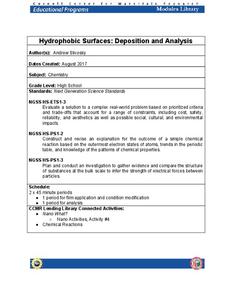Curated OER
Elements, Compounds, and Mixtures
In this elements, compounds, and mixtures worksheet, students answer questions about the properties of elements, mixtures, and compounds. Students identify the physical changes that is made to a substance to determine if it is an element.
Curated OER
Properties of Waves
Third graders observe and investigate wave properties and compare the properties of particles and waves. They fill a pie pan half full with water, place a toothpick in the center of the pie pan, then drop a marble into the pan and...
Curated OER
Up and Atom
"Up and Atom" is a mini-unit introducing middle-schoolers to the wonders of elements. Participants draw atom models, examine the periodic table, compare samples of metals to nonmetals, identify unknown elements, and more! The beginning...
Curated OER
Weathering and Erosion
In this earth science worksheet, learners use the clues given at the bottom of the sheet to help them solve the crossword puzzle on weathering and erosion. They identify the various factors that cause erosion in different places.
Curated OER
Particle Size and Oil Production
Students investigate how permeable different materials are. For this physics lesson, students determine what affects permeability and how permeability relates to oil production.
Curated OER
Physics and the Quantum Mechanical Model
In this physics worksheet, students review vocabulary terms and key equations associated with the quantum mechanical model. Students apply the quantum theory to explain the photoelectric effect. This worksheet has 5 true or false, 12...
Curated OER
Activity Six -- Observing Magnetic Effects on Particle Beams (Student Page ) A Physics Lesson in Observation
This student page lists several steps in teaching observation with an oscilloscope and bar magnets.
The students can compare bar magnets with circular magnets on a particle beam . Students will learn more about focusing beams in particle...
American Museum of Natural History
Light Quest
Grab a partner and shed some light on light. A remote learning resource has scholars play a board game to answer trivia questions about light. They also read about how Einstein contributed to the understanding of light as both a wave and...
K12 Reader
Waves and Currents
Waves, currents, crests, and troughs. Using information provided in an article about waves and currents, readers define terms used to describe how energy travels.
Curated OER
The Left Hand Rule (For Motors)
The left hand rule, also known as Fleming's rule, is covered here with explanations and pictures to help undertanding. Examples of electric motors and generator use are given. A helpful set of slides which will help early physics...
Curated OER
Waves
An incredibly colorful PowerPoint presents all the facts and definitions about waves that you could need for beginning physical scientists. There are several useful links to online animations of wave action. This may have been produced...
Curated OER
States of Matter
Although the title is States of Matter, this presentation is a collection of 4 slides just dealing with gas particle behavior, pressure and the Laws of Boyles and Charles and Gay-Lussac.
Curated OER
Kinetic Molecular Theory
Students analyze and evaluate evidence that matter is made of tiny particles. They observe a series of phenomena involving solids, liquids, and gases to make inferences about the spacing, interactions and relative kinetic energies of the...
Curated OER
Magnetorheological Fluids
Young scholars conduct a series of experiments on magnetorheological fluids. In this physics instructional activity, students explain how these fluids behave in varying magnetic field strength. They give practical applications of...
Curated OER
Properties of Materials - Part B
Students describe the history of materials. They use the kinetic (particle) theory to explain changes of state in matter and trace the flow of heat during changes of state and chemical changes.
Curated OER
What is an Atom?
Third graders understand that the smallest particle is an atom. In this matter lesson, 3rd graders make a piece of aluminum smaller and smaller to see that what's left is still aluminum. Students recognize that cutting into smaller...
Curated OER
Magnetic Field
Students explore how compass and Gauss meter detect a magnetic field. In this physics instructional activity, students build their own Gauss meter and sensor based on given procedure. They cite real world applications of magnetism.
Curated OER
Simple Machines: The Wede & Lever
Young scholars describe how wedge and lever makes work easier. In this physics lesson, students analyze experimental data by creating a graph to see the trends. They calculate the work done and mechanical advantage of these simple machines.
Curated OER
Electromagnets
Students conduct a series of experiments on electromagnets. For this physics lesson, students build their own electromagnet and explain how it works. They determine the factors that affect its strength.
Curated OER
Defining the Atom
Words, words, words! This presentation uses plenty of them to define the atom, outline the history of what we know about atoms, and explain atomic and mass numbers. That's all! Informative, but not interesting, this slide show would be...
Ohio State University
Exploration Activities with Electrostatic Interactions
Step out of the 21st century and discover protons and electrons through observation. Using common materials, participants continually adjust their explanation of charges. The final assessment requires pupils to design their own...
Curated OER
The Photoelectric Effect in Photocells
Illuminate your physics class with this examination of a photovoltaic cell. Teach the structure and operation of the device using a diagram. Then make a human-powered, larger-than-life sized model of a PV cell. Learners become electrons...
Cornell University
Hydrophobic Surfaces—Deposition and Analysis
Couches, carpets, and even computer keyboards now advertise they are spill-resistant, but what does that mean? Scholars use physical and chemical methods to coat surfaces with thin films to test their hydrophobic properties. Then they...
Curated OER
Fossil Fuels (Part I), The Geology of Oil
Junior geologists work through three mini-lessons that familiarize them with the formation and location of fossil fuels. Part one involves reading about petroleum and where it comes from via a thorough set of handouts. A lab activity...























